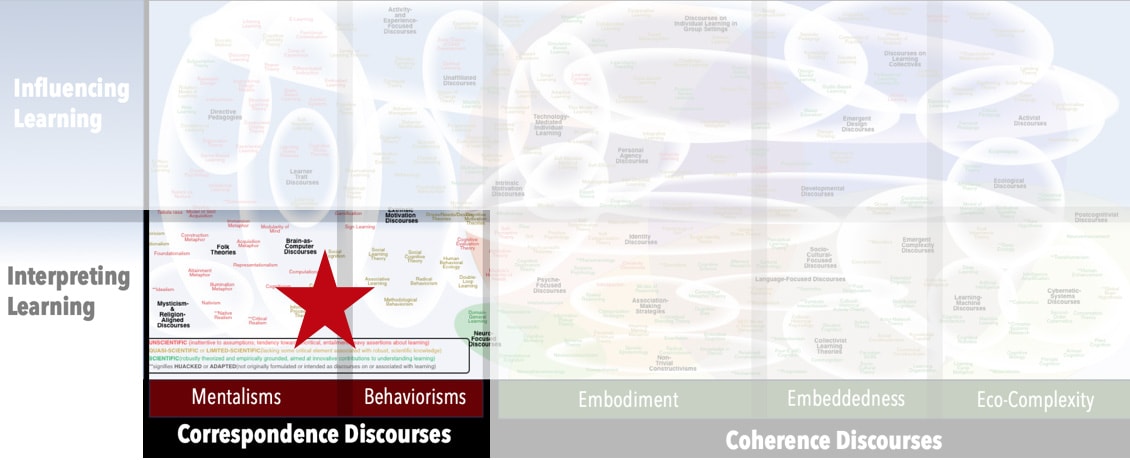Focus
Applying laws of causality to personal possibilityPrincipal Metaphors
- Knowledge is … predetermined possibilities
- Knowing is … acting and interpreting within predetermined frames
- Learner is … a pawn (individual)
- Learning is … being determined
- Teaching is … participating in determination
Originated
Ancient (entrenched in the language)Synopsis
Determinism refers to any belief system founded on the assumption that what will be is completely determined by what has been. The future entirely predetermined by already-existing causes. Several Determinisms have been proposed, varying according to what is taken as the source of the causes and what the futures controlled by those causes. Subcategorizations of Determinisms include:- Hard Determinism – the conviction that all human activity is causally determined – that is, one can exercise no meaningful control in one’s life (i.e., there is no free will)
- Soft Determinism – the position that all events have causes – but even though that includes human activity, it does not preclude some level of free will
- Biological Determinism (Biologism; Genetic Determinism) – the assertion that one’s intelligence, dispositions, and behaviors are controlled by one’s genes. (Compare Environmental Determinism, below.)
- Environmental Determinism – the perspectival that one’s intelligence, dispositions, and behaviors are controlled by environmental circumstances. (Compare Biological Determinism, above.) Variations of Environmental Determinism include:
- Cultural Determinism – the assertion that one’s culture determines who one is by defining one’s tastes, habits of interpretation, and so on.
- Linguistic Determinism – asserts that one’s language determines one’s worldview, what one perceives, and how one thinks, largely by imposing the categories one uses to parse the world (see Categorical Thought, under Modes of Reasoning; contrast: Linguistic Relativity, under Structuralism.)
- Social Determinism asserts that one’s behavior is determined by social phenomena such as education, relationships, group affiliations, and expectations. Illustrative examples of socially determined norms include:
- Reciprocity Norm – the extent to which one who provides assistance to others might expect comparable benefits from them, understood as a socially determined standard
- Social Justice Norm – the principle that assistance should be provided only to those who deserve help, understood as a socially determined standard
- Social Responsibility Norm – the extent to which one should aside those in need, understood as a socially determined standard
- Deterministic Psychology – an umbrella notion that encompasses any psychology that assumes Determinisms, including most Behaviorisms. Variations include:
- Behavioral Determinism (sometimes equated with the category of Behaviorisms) – the notion that all behavior can be traced to either reflexes or environmental triggers
- Psychological Determinism – the assertion that one is driven according to one’s perceived best interest. (Another version asserts that humans are compelled by reason, but few subscribe to this belief.)
- Physical Determinism – the suggestion that all events into the universe, including psychological ones, can be explained through models and theories developed within the physical sciences. Variations include:
- Mechanistic Theory (Mechanical Concept of Mind; Mechanistic Approach; Mechanical-Man Concept) – the notion that human functioning, including consciousness and sociality, can be understood in terms of mechanical processes – that is, that physics is sufficient for making sense of human activity
- Statistical Determinism – a variety of Physical Determinism (see above) in which it is acknowledged that some phenomena may be too complex to fully analyze or comprehend through the models and theories of the physical sciences, but they nonetheless must obey the laws of probability. That is, Statistical Determinism suggests that probability can be used to predict human phenomena.
- Technological Determinism (Thorstein Veblen, late-1800s) – a perspective founded on the notion that a society’s social structures and cultural values are determined by its technologies
Commentary
The diversity of Determinisms reveals not just a shared assumption, but a common conceptual flaw across all of them – namely, that Determinisms search for, posit, and/or desire singular, direct causes for complex phenomenon. In effect, they represent attempts to apply Newtonian mechanics to understand complex emergent phenomena. This point is critical, because uses of such adjectives as “social” and “cultural” have fooled some commentators into thinking that more complex causes are posited.Authors and/or Prominent Influences
DiffuseStatus as a Theory of Learning
Not all Determinisms are theories of learning. However, some explicitly are (e.g., Behaviorisms), and all have something to say about learning.Status as a Theory of Teaching
Determinisms are, in general, not theories of teaching. However, some – and especially Behaviorisms – speak directly to matters related to influencing learning.Status as a Scientific Theory
As a class of perspectives, Determinisms fall well short of meeting the standards of scientific theories.Subdiscourses:
- Behavioral Determinism
- Biological Determinism (Biologism; Genetic Determinism)
- Cultural Determinism
- Deterministic Psychology
- Environmental Determinism
- Hard Determinism
- Linguistic Determinism
- Mechanistic Theory (Mechanical Concept of Mind; Mechanistic Approach; Mechanical-Man Concept)
- Physical Determinism
- Psychological Determinism
- Reciprocity Norm
- Social Determinism
- Social Justice Norm
- Social Responsibility Norm
- Soft Determinism
- Statistical Determinism
- Technological Determinism
Map Location

Please cite this article as:
Davis, B., & Francis, K. (2023). “Determinisms” in Discourses on Learning in Education. https://learningdiscourses.com.
⇦ Back to Map
⇦ Back to List
